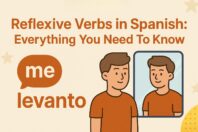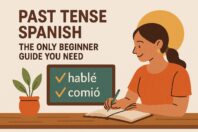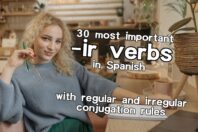What Are Modal Verbs In Spanish And How To Use Them

Get our free email course, Shortcut to Conversational.
Have conversations faster, understand people when they speak fast, and other tested tips to learn faster.
More infoModal Verbs in Spanish are verbs that have a special characteristic, since they can work on their own, or with another “main” verb that is always in the infinitive.
For example, the verb “querer,” which means “to want.”
- Yo quiero ese carro – I want that car
- Yo quiero comprar ese carro – I want to buy that car
As you can see, the above verb works on its own and also with another verb (comprar, in this case) in the infinitive.
The name “modal verb” comes from the fact that modal verbs indicate modality, or in simple terms, a possibility, necessity, ability, obligation, or permission.
Let’s imagine that you and some friends are going to see a movie. You are waiting for one more friend to arrive, but you aren’t sure he wants to see the same movie.
- El quiere ver la pelicula nueva? – Does he want to see the new movie?
In this situation, we have two verbs in the sentence. The verb ver (to see) is the main verb that expresses the action, and the verb querer (to want) acts as a conditional and is known as a modal verb.
Modal verbs help us determine the relationship between the subject (he) and the activity (to see a movie). In the above example, the answer will reveal what the subject’s desire is in relation to the action.
Modal Verbs In Spanish: Basic Structures
Below are three common grammatical structures where you will find modal verbs commonly used.
1. Modal verb + Infinitive verb
Personal pronoun + Modal verb + Infinitive + Complement
Examples:
- I can do the homework – Yo puedo hacer la tarea
- Ana must clean her room – Ana debe limpiar su habitación
2. Modal verb + to + Infinitive verb
Personal pronoun + Modal verb + Que + Infinitive + Complement
Examples:
- You have to buy the newspaper – Tú tienes que comprar el periódico
- We have to pass the exam – Nosotros tenemos que aprobar el examen
3. Object pronoun + Modal verb + Infinitive verb
Personal pronoun + Object pronoun + Modal verb + Infinitive + Complement
Examples:
- They want to help us clean – Ellos nos quieren ayudar a limpiar
- You want to lend me money – Usted me quiere prestar dinero
The below table shows us a series of modal verbs commonly used, and the meaning that each one of these normally gives to a verb or the whole sentence.
Let’s take a look:
| English meaning | Spanish meaning | Modal verb |
| Possibility | Posibilidad | Poder – Querer |
| Necessity | Necesidad | Necesitar |
| ability | Habilidad | Saber |
| Obligation | Obligación | Deber – Tener que |
| Permission | Permiso | Permitir |
| Regularity | Regularidad | Soler |
1) Can – Poder
- Teachers can come to class – Los profesores pueden venir a clases
- My friends can not go to the movies – Mis amigos no pueden ir al cine
2) Must – Deber
- Children should sleep early – Los niños deben dormir temprano
- You should not come tomorrow – Ustedes no deben venir mañana
3) Want – Querer
- I want to have a party – Yo quiero hacer una fiesta
- The dog does not want to eat – El perro no quiere comer
4) Need – Necesitar
- We need to read the book this weekend – Nosotros necesitamos leer el libro este fin de semana
- They do not need to be here- Ellos no necesitan estar aquí
5) Know – Saber
- She knows how to explain the lesson – Ella sabe explicar la lección
- Students do not know the exam date – Los estudiantes no saben la fecha del examen
6) Allow – Permitir
- The policeman allows to drive on the avenue – El policía permite conducir en la avenida
- The computer does not allow to install the program – La computadora no permite instalar el programa
7) Have to – Tener que
- You have to say something – Usted tiene que decir algo
- They do not have to walk to the house – Ellos no tienen que caminar a la casa
8) Usually do – Soler
- I usually study in the mornings – Yo suelo estudiar en las mañanas
- They do not usually go to that place – Ellos no suelen ir a ese lugar
Could, Should, Would
Although you may notice some similarities, modal verbs in Spanish and English are very different.
In English, modal verbs are not enough to express an idea, concept or situation on their own – instead they need a second verb in order to make sense.
In Spanish, modal verbs are more flexible and can have meaning on its own, without any other verb, as we have seen before.
In saying that, there are three modal verbs in Spanish that don’t follow this rule:
- Could – Podría
- Should – Debería
- Would – English conditional / Auxiliary verb
In Spanish, podría (could) and debería (should) will always need another verb in its infinitive form in order make sense.
On the other hand, would doesn’t even have a direct equivalent in Spanish, since the conditional is expressed with a specfic conjugation in Spanish.
Here are two examples of the conditional tense in action:
- I would run faster… – Yo correría más rápido…
- She would sleep more… – Ella dormiría más…
(PS, we wrote a beginners guide to the Spanish conditional tense here)
As you can see, in English you simply add “would” before the main verb in order to turn it into a condition – whereas the Spanish equivalent requires changing the ending of the verb when a condition is intended.
9) Could – Podría
- The food could be ready at noon – La comida podría estar lista al mediodía
- The surprise could not be better – La sorpresa no podría ser mejor
10) Should – Debería
- You should rest tomorrow – Tu deberías descansar mañana
- They should not wait – Ellas no deberían esperar
11) Would – Conditional Tense
- I would buy those shoes – Yo compraría esos zapatos
- We would not do that – Nosotros no haríamos eso

Unsure what to learn next?
Download the exact curriculum that thousands of BaseLang students have used to become fluent in Spanish.
Download Guide Now!
One Last Thing: Will + Verb
In English, “will” works a modal verb and is placed before a verb in order to talk about future actions (e.g. I will go, you will arrive, we will eat).
In Spanish, the same concept works a little differently since we use the simple future tense which has its own conjugation that requires changing the ending of the verb, in a similar way to how we saw the conditional being used for “would”.
(we wrote a full blog post on the simple future tense here.)
For example:
- I will travel next summer – Yo viajaré el próximo verano
- He will cook for her girlfriend on valentine’s day – Él cocinará para su novia el día de San Valentín
- She will not work tomorrow – Ella no trabajará mañana
Modal Verbs In Spanish: Exercices
Now it’s time to see how well you understand modal verbs.
(scroll down for answers)
1. Correct the following sentences maintaining the original personal pronoun.
- Tú deber comer la ensalada
- Ellos debo estar en casa
- Mi amiga y yo tener que visitar el hospital
- Ustedes necesito hacer ejercicios
- Usted pueden ir al restaurante
2. Translate the following sentences.
- Hoy tenemos que comprar comida
- El próximo fin de semana tengo que buscar a mi mamá en el aeropuerto
- El carro tiene que estar limpio antes del mediodía
- No tienes que llamar, sólo tienes que enviar un mensaje
- Si no quieres, no tienes que ir a la reunión
3. Create sentences using the following words.
- Jorge – cantar – querer – la – canción
- Mis padres – descansar – soler – los – domingos
- Ana y yo – estudiar – deber – el – fin de semana
- Usted – hacer – poder – el – viaje
- Yo – lavar – necesitar – el carro
Answers
1.
- Tú debes comer la ensalada
- Ellos deben estar en casa
- Mi amiga y yo tenemos que visitar el hospital
- Ustedes necesita hacer ejercicios
- Usted puede ir al restaurante
2.
- Today we have to buy food – Hoy tenemos que comprar comida
- Next weekend I have to pick up my mom at the airport – El próximo fin de semana tengo que recoger a mi mamá en el aeropuerto
- The car has to be clean before noon – El carro tiene que estar limpio antes del mediodía
- You do not have to call, you just have to send a message – No tienes que llamar, sólo tienes que enviar un mensaje
- If you do not want to, you do not have to go to the meeting – Si no quieres, no tienes que ir a la reunión
3.
- Jorge quiere cantar la canción
- Mis padres suelen descansar los domingos
- Ana y yo debemos estudiar el fin de semana
- Ustedes pueden hacer el viaje
- Yo necesito lavar el carro


